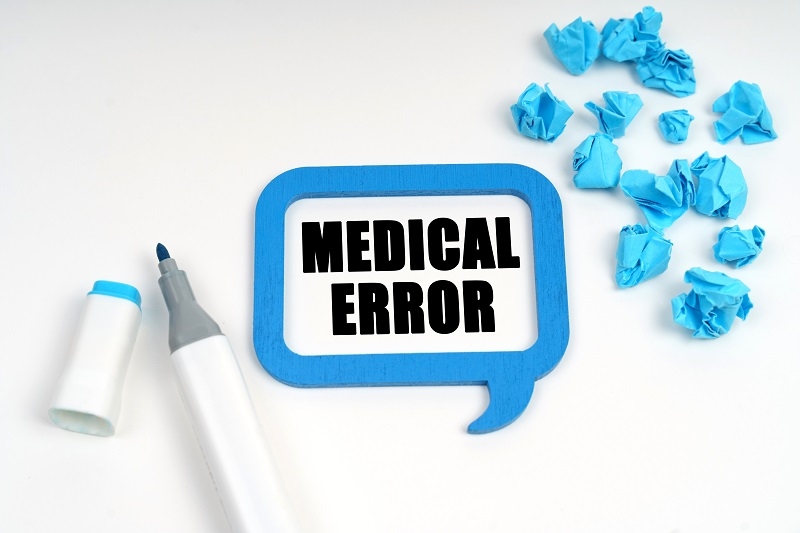Prevent Medication Mistakes by Taking Control of Your Health

Taking management of your fitness method, actively managing how medicinal drugs are used. Medication errors can manifest in anyone, leading to severe complications, adverse outcomes, or decreased treatment effectiveness. By having expertise in prescription safety, averting dosage errors, and being privy to facet results risks, patients can considerably improve their results. This guide offers practical strategies, prevention pointers, and stable management practices that empower you to avoid mistakes, stay knowledgeable, and proactively manage your health for long-term protection and well-being.
Recognizing Medication Errors and Their Consequences
Medication mistakes are part of the prescription, dispensing, and taking of medicine techniques. The time period can mean everything from nonconsequential errors like missing a dose to lifestyle-threatening errors that increase a patient's risk.
Typical Medication Errors Include
- Confusing medications with comparable names.
- Misreading labels or commands.
- Taking the incorrect dose or the incorrect frequency.
- Not being aware of viable interactions or allergies.
Consequences of Medication Errors Include
- Growth in a medical facet can, in all likelihood, cause symptoms such as nausea, dizziness, or organ damage.
- Possible worsening of an underlying circumstance.
- Potentially resulting in pressing journeys to the medical institution or long-term health issues.
Why is Prevention Important?
- Ensures the safety of medicine for every affected person.
- Reduces risks in healthcare and healthcare spending.
- Enables sufferers to be involved in their own care.
Prescription Safety as the Foundation
Ensuring the safety of prescriptions is the first step in decreasing medication mistakes. Ultimately, secure control will ensure that medicinal drugs provide a powerful remedy without causing damage.
Understanding your Prescription
- Verify the precise medicine, dosage, and instructions with your physician or pharmacist.
- Inquire about alternative medicinal drug capsules and/or manufacturers vs. familiar alternatives.
- Keep a modern-day listing of prescriptions for brief reference.
Verifying Drug Interactions
- Regardless of your scenario, review all drug treatment options along with your healthcare provider, including prescription medicine, over-the-counter drugs, and dietary supplements.
- Watch for interactions that boost the effects of medications, pose risks, or lessen medication effectiveness.
- Maintain an open conversation about changes in fitness recognition.
Organizing Your Medications
- Use tablet organizers or classified containers to reduce confusion.
- Track doses and top off dates with apps or charts.
- Store drug treatments in a stable, dry, and properly-lit location to save you from degradation.
Dosage Mistakes and How to Prevent Them?
Mistakes with dosing are one of the most common reasons for a medication error, and may lead to a drug being either underdosed or overdosed.
Frequent Dosage Errors
- Skipping doses or accidentally taking a larger dose.
- Mistakes in measuring liquid medication.
- Not following specific instructions to take with or without food or specific medication.
Ways to Prevent Dosage Errors
- Use the proper measuring device for liquid medications.
- Set a watchdog alarm or reminder for regular dosing schedules.
- Before taking each dose, double-check the specifics on the label and instructions.
Involving Caregivers for Support
- Caregivers can help to check during a fixed schedule.
- Keep a collaborative log of what doses have been given or taken to avoid duplicating a dose.
- Encourage ongoing learning and thoughtful discussion regarding missed doses or incorrect doses.
Recognizing and Managing Side Effects Risks
Understanding the risk of side effects helps patients deal with problems and plan to prevent serious side effects.
Common Side Effects
- Mild (no disruption to daily routines): Nausea, fatigue, headaches, or drowsiness.
- Moderate (some disruption to daily routines): Dizziness, rash, or gastrointestinal issues.
- Severe (situations requiring hospitalization): Organ damage, allergies, or life-threatening side effects.
Strategies for Reducing Side Effects Risks
- Follow labeling safety precautions closely.
- Do not consume alcohol, tobacco, or other substances that have been known to interact with prescription medication adversely.
- Educate patients to notify their prescriber or pharmacist about any unusual symptoms with prescription medication.
Patient and Caregiver Education
- Educate patients on carefully reviewing medication guides closely.
- Encourage caregivers to look for abnormal early warning signs.
- Provide resources that include emergency contacts and instructions for medication modifications.
Safe Handling Practices for Medications
Proper steady management prevents errors, contamination, and accidental ingestion by children or pets.
Storing Medications Safely
- Keep drug treatments in genuine boxes with labels intact.
- Tuck in a controlled location away from kids, pets, and extreme temperatures.
- Dispose of expired or unused medicinal drugs appropriately through take-back programs.
Traveling With Medications
- Use labeled travel containers for your advantage.
- Keep medicinal capsules in the carry-on luggage to avoid temperature variations.
- Keep a travel log of dosage and timing to save you from mistakes.
Hygiene and Administration Safety
- Wash your hands before medicating.
- Avoid touching pills directly; use simple tools or dispensers.
- Do not medicate between patients voluntarily or without professional advice.

Prevention Tips for Reducing Medication Mistakes
Recommendations for prevention are essential for patients and caregivers to minimize errors and improve treatment outcomes.
Establishment of Medication Management Routine
- Take your medicinal capsules at the same time every day to help with the consistency of taking our medications.
- Keep a checklist/track of each dose taken to assist with adherence.
- Review medication once weekly to note function errors or any expired capsules.
Effective Communication with Healthcare Providers
- Speak up about any impact or dose issues you may have.
- Inform organizations about ways of lifestyle adjustments or new nutritional dietary supplements.
- Schedule every day, and take a look at the effectiveness.
Patient Education and Awareness
- Encourage studying of all labels and commands thoroughly.
- Provide education for caregivers on secure management and dosage control.
- Offer steering on figuring out the early signs of side effects and dangers.
Technology Solutions to Prevent Medication Mistakes
Modern gear provides an additional layer of safety for patients and caregivers.
Digital Medication Reminders
- Apps ship signs for upcoming doses and replenish needs.
- Monitor missed doses and supply records of usage for healthcare entities.
Smart Pill Organizers
- Dispense accurate doses automatically at scheduled times.
- Minimize confusion for patients on multiple medications.
Telehealth & Remote Patient Monitoring
- Provides real-time guidance for dosage adjustments.
- Allows for early detection of side effect risk.
- Facilitates the protection of patients through virtual visits.
Unique Factors Related to Chronic Disease
Patients with chronic disease are especially vulnerable to medication errors due to complex regimens.
Managing Multiple Medications
- Maintain a list of prescribed medications with doses and times to take them.
- Synchronize refills to ensure you don't run out of essential medications.
- Use a pill organizer that is labeled by color or by category for easy management of your medications.
Monitoring Outcomes
- Track signs, laboratory results, and changes in your symptoms.
- Keep your healthcare provider informed of changes to prevent exacerbating chronic disease states.
- Adjust workouts to balance drug treatments with lifestyle goals thoroughly.
Caregiver Involvement
- Caregivers can screen adherence and side effects and deliver a lift to safe handling practices.
- When working with a pair of sufferers, rotate roles to decrease scrutiny.
- Provide emotional support to keep them engaged and adhere to the recommendations.
Mistakes with Medications in Vulnerable Populations
Specific populations have a higher risk of errors due to cognitive, physical, or age factors.
Older adults
- Memory lapses may also increase the chances of missed or duplicate doses.
- Vision problems may, moreover, make analyzing labels tough.
- Caregivers have to confirm doses and arrange medication systems.
Children and Adolescents
- Accidental ingestion isn't uncommon if secure handling is unnoticed.
- Caregivers need to be trained in the proper use and secure storage of medications.
- Encourage adherence via ordinary and training.
Patients with Cognitive Impairments
- Memory or comprehension difficulties, growth dosage mistakes.
- Implement simple, primarily based exercises with easy labeling.
- Use digital reminders or caregiver supervision for the affected individual's safety.
Developing a Culture of Medication Safety
Preventing medication errors requires commitment by patients, caregivers, and healthcare providers.
Education and Training
- Host education programs focused on medication safety and dosage errors
- Provide resources on products, side effects, risks, and how to handle medications safely.
- Encourage continuous education to help maintain competency
Collaboration with Healthcare Teams
- Maintain up-to-date communication with the patient, caregiver, and healthcare team.
- Communicate about lifestyle changes, supplements, or new medications
- Ensure everyone knows what to do in case of an emergency or in preventive measures.
Personal Responsibility
- Take responsibility for your health and adhere to routines.
- Ask questions and give clear instructions while being doubtful.
- Promote steady handling conduct in the circle of relatives and community settings.
Conclusion
Preventing medication mistakes requires lively engagement, consistent prescription safety, careful monitoring of dosage errors, identification of risk factors, and secure coping with practices. By following dependent prevention hints, concerning caregivers, and leveraging generation, sufferers can take control of their fitness and ensure more stable, more powerful treatment outcomes each day.
This content was created by AI

